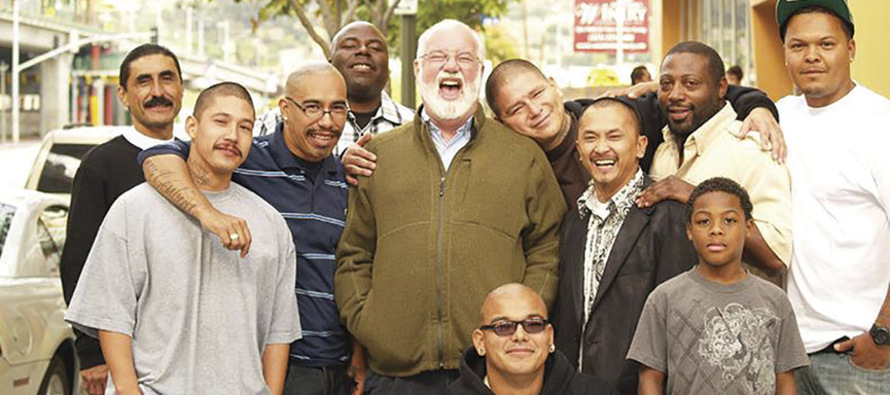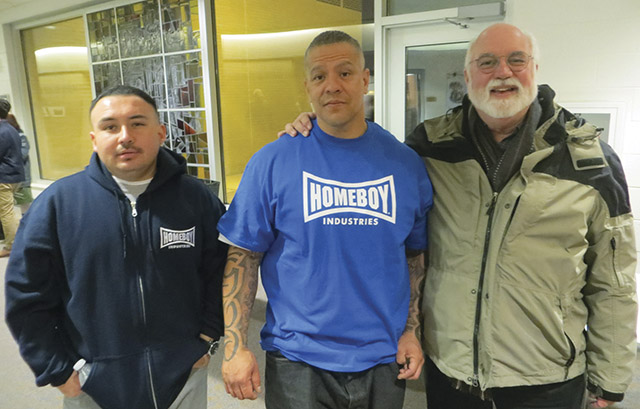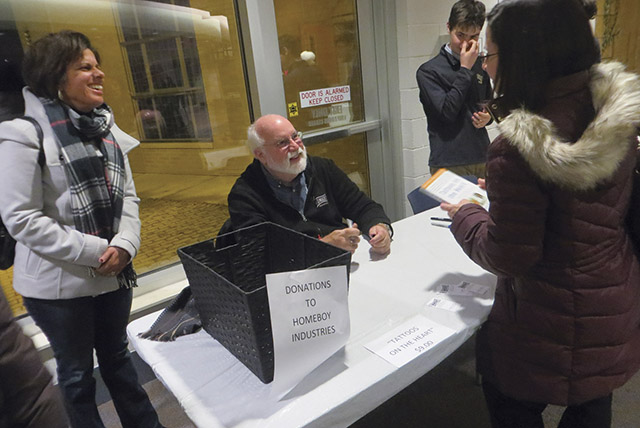Tendering God on tough streets

Father Greg Boyle, S.J. with his “homies.” (Photo courtesy of Homeboy Industries)
Jesuit priest Greg Boyle knows how to work a crowd. He’s been hustling money for his work with poor people for much of his priestly life. As a priest, he’s been hustling souls for even longer. But “hustle” is too harsh a term for the God that Boyle is talking about tonight.
As a winter drizzle falls on Toledo, Ohio, he stands at a podium in St. John’s Jesuit High School, and a small audience of do-gooders, church folk, and teenaged boys is in the palm of Boyle’s hand. He warmed them up by having two “homies”—former gang members in this case—tell heartbreaking stories of abuse, neglect, loss, and self-discovery through Homeboy Industries, the gang alternatives ministry in Los Angeles that Boyle has given his life to.
Boyle begins with funny stories about his homies, and the audience is laughing hard. He is the quintessential Irish storyteller. These middle-class Toledoans—most of whom have never met a tattooed gangbanger with a prison record—are starting to feel like they can relate to the characters in Boyle’s tales.
A young woman at the Homegirl Cafe, which employs high-risk, formerly gang-involved women (and where “waitresses with attitude serve you,” Boyle quips), once obliviously waited on Diane Keaton. Boyle details the incident with Keaton: “ ‘You seem familiar,” the waitress says. She’s a big girl, ‘been there, done that’ tattooed on her, a felon parolee. ‘Wait a minute! I feel like I know you from somewhere, like maybe we’ve met?’ the waitress continues.”
Keaton demurred, says Boyle. The priest’s timing is perfect, and he nails the punch line: “ ‘Now I know it! We was locked up together!’ ” The crowd roars.

All heart
Boyle deftly weaves together humor, theology, and social justice. His themes are similar to those in his popular book Tattoos on the Heart: The Power of Boundless Compassion (Free Press, 2010). He wears on his sleeve his affection for the mostly male, Hispanic gang members that he ministers to. He gives to his homies, and he receives from them their love and energy. “I challenge you to say who is serving and who is being served,” he notes after one story.
Here’s what Boyle says a lot—and not just this night in a Rustbelt city with gang troubles of its own.
• God is bigger than you think. More merciful. More forgiving.
• You have to go to the margins to help make barriers between people go away.
• “Service,” as church people call their good works, “is just the hallway to the ballroom. The ballroom is kinship,” where people of all types can all enjoy mutual love, respect, and mutuality.
The crowd stops Boyle’s words with loud clapping several times. Story after story seems aimed at opening the hearts in the room. Perhaps there is room in those hearts to love these fierce and scary people whose tattoos and manner of speech can be so off-putting. They are felons, yes, but now the audience knows before that happened, they were children with lives so twisted and horrifying that the guest homies can only make veiled references to their pasts.
Homeboy Industries aims to break the cycle of gang violence in Los Angeles by offering services that heal and help. They include but are not limited to education, legal aid, tattoo removal, counseling, substance abuse, and a variety of social enterprises that offer jobs and job-training to at-risk individuals.
“Homeboy Industries is the largest and most successful gang intervention, rehab, and reentry program in the world and has become a model for other organizations and cities,” according to homeboyindustries.org. The organization was founded in 1988 by a group of concerned citizens led by Father Greg Boyle, S.J.
Boyle’s voice quivers and cracks, and hearts open up a little wider. He’s telling about a gang member who has committed violent crimes. When he was 9, his mother slit her wrists and bled to death in front of him, blaming him as she died. The ensuing years did not get better, until one day, as an adult, this child-victim-turned-victimizer breaks down in tears with Boyle.
The room is silent. No one draws a breath. Perhaps the audience members are wondering about the criminals they see on TV news reports. Could it be that people who seem so cruel were once kids who got beatings instead of meals?
Open arms
Boyle is a good pastor, though, and he gently moves his listeners where every good pastor wants to take a crowd, straight into the wide arms of God. “In the end we’re doomed to imitate the kind of God we believe in,” he says. “So if our God is tiny and puny and exacting and demanding, always asking us to measure up but is eternally disappointed, how could we possibly be other than that?
“The trick is, as Saint Ignatius of Loyola always said, to look for the God who’s always greater. The God who is expansive and spacious and loves us without measure, without regret. How do we discover the God of compassionate, loving kindness, who asks us to be in the world what God is? We have to tinker a little.
“I once had a Jesuit spiritual director who said we need a better God than what we have. And I think it’s true. We are endlessly creating God in our own image. We can’t help ourselves, but we certainly can catch ourselves. Anne Lamott says you know you’re creating God in your own image when God hates all the same people you do.”

Having established that understanding of the faith foundation that he offers donors and gangbangers alike, Boyle tells a few more stories. They are funny, sad, and tender. And then it’s time for questions. Can something along the lines of Homeboy Industries help a place like Chicago, where gang violence is at a boiling point? Boyle speculates a bit, but declines the role of chief gang advisor.
He fields more questions and encourages people to ask questions of his homies, Luis Colocio and Nicholas Lopez of Homeboy Industries. A woman asks, how do you break the cycle of violence? Boyle looks pleased to hand the microphone to Lopez, who explains how he is raising his 6-year-old daughter differently than he was raised. Later Colocio tells the audience that a turning point from addiction and gang life was getting a job. He chokes up a little when he recalls his astonishment that someone would give him a real job, and a sustained applause washes over him.
The session wraps up, and now Boyle is seated at a table with St. John’s students selling his book at one end as he signs books at the other end. He peers up at book owners, asking their names so he can personalize his signature. He poses when people ask for photos. Only a few stragglers are left as he bundles up money from a donation box, chatting affably. Whereas Colocio and Lopez eagerly nod or bob their heads when speaking to these private school families—“Yes, ma’am,” “No, sir,”—Boyle is at ease.
"I was educated by the Jesuits. They were hilarious and prophetic, and it was one of those ‘I’ll have what they’re having’ moments,” says Father Greg Boyle, S.J. “I joined right out of Loyola High School [in Los Angeles, in 1972]. They were just the most amazing human beings. It was during the Vietnam War; they were the funniest human beings I had ever met; and they were kind of: ‘Here, get in the van, we’re going to drive to San Francisco and we’ll protest the war.’ I [thought], ‘Well count me in!’ I just loved it. It was prophetic.”
He is 62 years old, and he has seen a lot over three decades in central city ministry. When he first began at Dolores Mission Church in central Los Angeles, the gang violence was overpowering. He recalls once doing eight funerals in a three-week period. That was his impetus to start looking for solutions, which led to the multifaceted outreach programs of Homeboy Industries.
Tonight he still has a drive ahead of him, and the hour is growing late. A few more thank-yous, a discussion about the easiest way to his car, and Father Greg Boyle, S.J. and friends are out the door.
Tomorrow they do essentially the same thing all over again in Cleveland. Homeboy Industries will take home some needed funds. And here in two heartland cities—each with troubles that people in central Los Angeles might understand—Boyle’s vision of kinship and God’s generous love has been scattered like a seed.
Related article: VocationNetwork.org, “Fighting gangs one youth at a time.”
Tags
Related
- Taking a chance on God: Profile of Father David Gutierrez, C.M.F.
- About-face to the priesthood
- Moved by the power of the Eucharist: Profile of Father Duy Henry Bui Nguyen, S.C.J.
- No regrets: A grateful priest takes stock
- We’re different—in a good way: Profile of Father Roberto Mejia, O.Carm.
- Man with a mission
- Monastic life is habit-forming
- Ministering to migrants in a carport cathedral
- Connections make the man: Profile of Father Kevin Zubel, C.Ss.R.
- A priest (who’s been there) responds to the pain of addiction Read More
Most Viewed
- Find your spirituality type quiz
- Questions and answers about religious vocations
- Celibacy quiz: Could I be a nun? Could I be a brother? Could I be a priest?
- Resources for older discerners or those with physical and developmental differences
- About Vocation Network and VISION Guide


